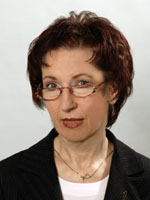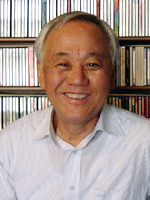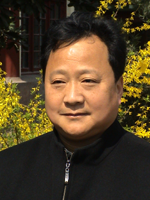- 기조강연 (Plenary Lectures)
 |
Gabriele
Kaiser
Professor of
Mathematics Education, Faculty of Education, University of
Hamburg, Germany
Member of the International Programme
Committee (IPC) of ICME-12
email: gabriele.kaiser@uni-hamburg.de
M.A. University of Kassel, 1978
Ph.D. University
of Kassel, 1986
Professor, University of
Hamburg, 1998-Present
Postdoctoral, University of Kassel,
1997
Her areas of research include modelling
and applications in school, international comparative studies,
gender and cultural aspects in mathematics education and empirical
research on teacher education.
|
Mathematical Modelling in School – Examples
and Experiences
The lecture will start with an
analysis of the recent international discussion about modelling in
mathematics education, describing different perspectives on
modelling around the world. Furthermore the concept of modelling
competencies is presented and different facets of this concept are
elaborated. Afterwards, the lecture will discuss various attempts
for establishing modelling examples in school teaching. It will be
reported amongst others about joint modelling projects with future
teachers in school.
The contribution will present
selected modelling examples, which have been used in modelling
weeks with students from upper secondary level:
• Optimal
positioning of rescue helicopters
• Optimal positioning of
water irrigation systems
• Development of ladybugs
Some of the students’ solving attempts will be
presented for the selected modelling examples including the
students’ reaction to it.
Finally, experiences with
modelling examples in school will be described including results
from research on the development of modelling competencies and the
students’ beliefs on
modelling.
|
 |
홍성사 (Sung Sa Hong)
서강대학교
명예교수(Professor Emeritus of Sogang University)
Email: sshong@sogang.ac.kr
서울대학교 이학사, 1964
연세대학교 이학석사, 1966
McMaster
University, Ph.D., 1973
NRC Postdoctoral Fellow at Carleton
University, 1973-1975
서강대학교 전임강사, 조교수, 부교수, 교수,
1967-2009
한국수학사학회 회장,
2001-2008 |
조선 산학자 이상혁(朝鮮 算學者 李尙爀) (이상혁 탄생 200주년 기념
강연)
구일집(九一集)의 저자 홍정하(洪正夏, 1684?)와 함께 조선 산학자로 가장
위대한 업적을 이루어낸 이상혁(李尙爀, 1810?)이 금년에 탄생 200주년을 맞게 되었다.
이를 기념하여 그의
생애와 업적을 논하는 것이 이 발표의 목적이다.
홍정하와 달리 이상혁은 17세기부터 조선에 들어온 서양 수학과
19세기에 들어온 송, 원대의 수학을 함께 연구할 수 있어서 여러 분야에 걸쳐서 창의적이며 구조적인 연구 업적을
남겼다. 특히 송, 원대의 방정식론과 퇴타술이 17세기 이전에 정립된 서양 수학에 비하여 뛰어남을 밝혀내었다. 이
분야에서 이룬 그의 연구 결과를 논한다.
|
-
수학교육 특별초청강연 (Special Invited Lecture on
Mathematical Education)
 |
Tu,
Rongbao
Professor of
College of Mathematics Science, Nanjing Normal University,
China
Mentor for Doctor & Graduate Students, Nanjing
Normal University
Leader in the Subject of Mathematics
Curriculum & Instruction
Chief Director, Chinese
Association of Mathematics Education
Chairman, Nanjing Mathematics Academy
Editor in
Chief of Mathematics, Company
Magazine
Vice Editor in Chief, Journal of Mathematics
Education, China
Member of Editorial Board, Journal of
Mathematics Education,
USA |
Characteristics and New Viewpoint of
Mathematics Education in China
Introduction
1. The
Guiding Principles of Mathematics Teaching in
China
1.1 Strengthen the “two basics” in
teaching
1.2 Develop mathematics thinking skills
1.3
Preserve heuristic
1.4 Respect mathematical activity
approach
2. Several Characteristics of Classroom
Teaching of Mathematics in China
2.1 Explicit
objectives and refined knowledge
2.2 Review prior knowledge
and develop new knowledge
2.3 “Two basics” teaching and
insights come out of familiarity
2.4 Practice with variation
and understand with depth
2.5 Mathematical communication and
student-teacher interaction
2.6 Penetrate ideas and master
methods
2.7 Develop thinking and cultivate ability
2.8
Cons and pros of exam-orientation
3. New Viewpoint of
Mathematics Education
3.1 Sustainable development is
the basic objective of education
3.2 Implement the basic
principles of mathematics teaching
3.3 “Teaching” —— “teach”
students to “learn”
3.4 Better to propose a problem for
importing a new lesson
3.5 “Teach” students to “learn” ——How
to do it?
3.6 Use the “Exploring from scratch” method to
teach
3.7 Teachers’ guidance with heuristic prompts
3.8
Hierarchical prompt for students at different
levels
|
|